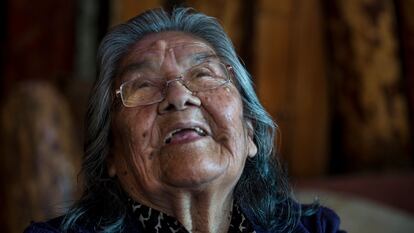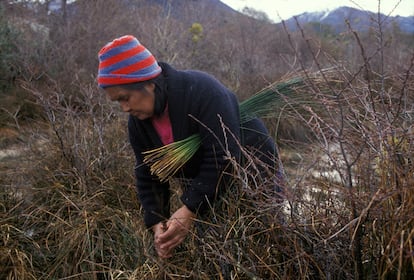Cristina Calderón, last speaker of Yaghan language, dies in Chile at 93
Considered a Living Human Treasure by UNESCO, she worked for years to preserve the culture of indigenous people from Tierra del Fuego at the southern tip of South America


No one else will speak the Yaghan language. At the age of 93, Cristina Calderón has died and has taken with her the language of her ancestors, the Yaghan people. As the southernmost indigenous community on the planet, these nomadic canoe-faring people have inhabited Tierra del Fuego, at the southern tip of South America, for 6,000 years. Calderón was the last full-blooded Yamana – another name for the Yaghan people – and the custodian of a culture that has been lost as a result of mixing with other indigenous tribes and white people.
Cristina Calderón had been declared a Living Human Treasure by the Chilean government and UNESCO. She left behind seven children and 14 grandchildren, but none of them speak her language like she did. Her youngest daughter, Lidia González Calderón, is one of the indigenous lawmakers who are currently drafting the new Chilean Constitution. “All the work I’m currently doing, I am doing it in your name, and your people will also be reflected in that work. I feel a deep sorrow for not having been with her at the moment of her death. This is sad news for the Yaghan people,” wrote González on Twitter.
“When my sister Úrsula passed away I was left alone, with no one to talk to,” said Cristina Calderón in 2016, in an extensive feature published by EL PAÍS. “I learned Spanish when I was nine years old. The father of a niece of mine was a gringo, and they taught me little by little,” she recalled in her house in Villa Ukika, in Puerto Williams, with a view of the Beagle Channel. “Back then everyone spoke Yaghan, but later they started to die, and I was left alone. The children did not want to learn the language. They were ashamed. White people laughed at them.” The Yaghan language had 32,400 words, an enormous amount when compared to the 5,000 words that any of us normally uses.
The Yaghan people traveled the icy Fuegian channels with their canoes and made a living from fishing. A paper published in the journal Science last October presented paleontological evidence that points to the presence of Yaghan people in the Falkland Islands long before the British or Argentines set foot on the archipelago. When the white people arrived on the island of Tierra del Fuego in the 19th century, there were about 3,000 Yaghan. Half a century later, the diseases brought by the Europeans had reduced their population to 130.

Mixing with Europeans, Anglican evangelization and the cultural pressures caused by colonization broke the natural chain of oral transmission of knowledge; the language began to disappear with the deaths of its last speakers. Calderón’s sister, Úrsula, passed away in 2003. Emelinda Acuña, another Yaghan speaker, died in 2012. Cristina Calderón was the last one left.
Even in the last years of her life, Calderón was determined to preserve and pass on everything she knew about her language and her culture. Together with her granddaughter, Cristina Zárraga, she created a Yaghan-Spanish dictionary that includes a CD where some words can be heard. They also published a book of indigenous legends, songs and stories called Hai Kur Mamašu Shis (I want to tell you a story). Her daughter Lidia Calderón promised, as a member of Chile’s constitutional convention, to defend her mother’s legacy and the Yaghan language, despite the challenges that this entails: “Even if with her death we lose a wealth of empirical knowledge, especially valuable in linguistic terms, the possibilities for the rescue and systematization of the language are open.”
Tu suscripción se está usando en otro dispositivo
¿Quieres añadir otro usuario a tu suscripción?
Si continúas leyendo en este dispositivo, no se podrá leer en el otro.
FlechaTu suscripción se está usando en otro dispositivo y solo puedes acceder a EL PAÍS desde un dispositivo a la vez.
Si quieres compartir tu cuenta, cambia tu suscripción a la modalidad Premium, así podrás añadir otro usuario. Cada uno accederá con su propia cuenta de email, lo que os permitirá personalizar vuestra experiencia en EL PAÍS.
¿Tienes una suscripción de empresa? Accede aquí para contratar más cuentas.
En el caso de no saber quién está usando tu cuenta, te recomendamos cambiar tu contraseña aquí.
Si decides continuar compartiendo tu cuenta, este mensaje se mostrará en tu dispositivo y en el de la otra persona que está usando tu cuenta de forma indefinida, afectando a tu experiencia de lectura. Puedes consultar aquí los términos y condiciones de la suscripción digital.








































